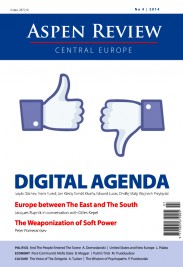Digital Agenda is the topic of the newest Aspen Review (4/2014). Inside you can explore questions pertaining to impacts of the Internet and new technologies on politics, economy and society.
Articles of the Cover Story tackle a wide range of issues from that of public institutions' transparency to the economic value of ICT-driven businesses. In an interview with Maciej Nowicki for example, Edward Lucas notes that "Snowden has done great damage to the West" and claims that the documents he published "had nothing to do with the violation of civil liberties". In the Myth of Transparency Ivaylo Ditchev analyses both positive and negative implications of new technologies on politics. He draws a line between efforts to maintain a balance between the feasible and desirable on the one hand and pursuit of maximum transparency on the other. He agues that in reality, the latter tends to fail its noble objectives and instead, often produces poor political decisions.
In their economic account of the internet economy sector, Jan Klesla and Ondřej Malý claim that the Internet is the electricity of the 21st century, as it results in adding value to all sectors of the economy. Basing on this argument, Wojciech Przybylsky and Kararzyna Szajewska call for comprehensive innovation policies in Visegrad countries. They propose a new approach to advocating the need for innovation-based growth, where innovation is seen as a means to help neutralize security threats.
Despite the distinctive technological focus, we did not abandon other pressing issues. In his analysis, Peter Pomerantsev finds that “the Kremlin believes soft power to be a set of tools for manipulation, a sort of weapon.” To counter this challenge, Pomerantsev calls for a broad gathering that would bring together think tanks, experts and policy makers to help reinvigorate the debate about the implications of Russian policy for both regional and global issues.
All Aspen Review articles, past and present, are available on-line. You can either read a particular text on-line or browse the whole issue in pdf format here.

